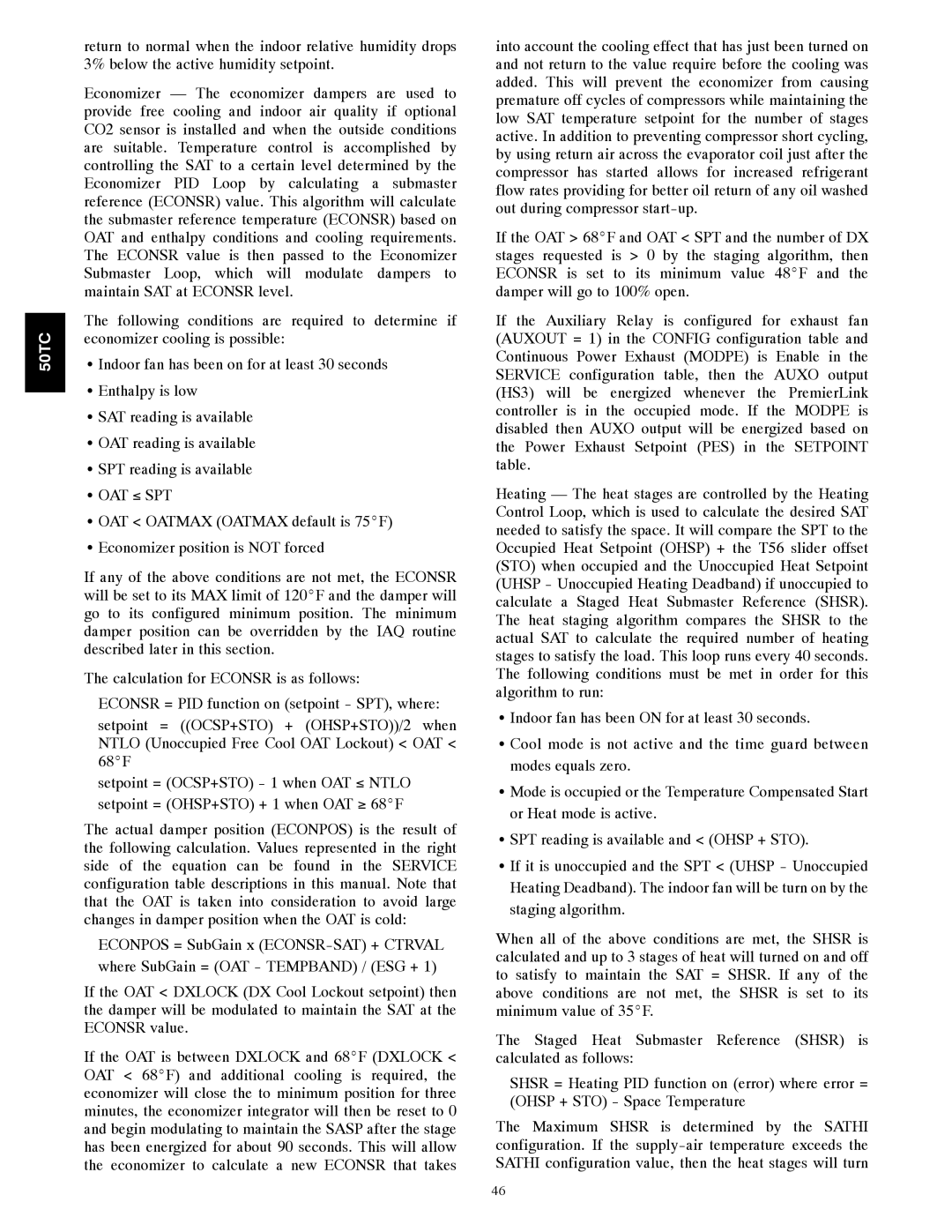return to normal when the indoor relative humidity drops 3% below the active humidity setpoint.
Economizer — The economizer dampers are used to provide free cooling and indoor air quality if optional CO2 sensor is installed and when the outside conditions are suitable. Temperature control is accomplished by controlling the SAT to a certain level determined by the Economizer PID Loop by calculating a submaster reference (ECONSR) value. This algorithm will calculate the submaster reference temperature (ECONSR) based on OAT and enthalpy conditions and cooling requirements. The ECONSR value is then passed to the Economizer Submaster Loop, which will modulate dampers to maintain SAT at ECONSR level.
The following conditions are required to determine if economizer cooling is possible:
S Indoor fan has been on for at least 30 seconds S Enthalpy is low
S SAT reading is available S OAT reading is available S SPT reading is available
S OAT ≤ SPT
SOAT < OATMAX (OATMAX default is 75_F) S Economizer position is NOT forced
If any of the above conditions are not met, the ECONSR will be set to its MAX limit of 120_F and the damper will go to its configured minimum position. The minimum damper position can be overridden by the IAQ routine described later in this section.
The calculation for ECONSR is as follows:
ECONSR = PID function on (setpoint - SPT), where:
setpoint = ((OCSP+STO) + (OHSP+STO))/2 when NTLO (Unoccupied Free Cool OAT Lockout) < OAT < 68_F
setpoint = (OCSP+STO) - 1 when OAT ≤ NTLO setpoint = (OHSP+STO) + 1 when OAT ≥ 68_F
The actual damper position (ECONPOS) is the result of the following calculation. Values represented in the right side of the equation can be found in the SERVICE configuration table descriptions in this manual. Note that that the OAT is taken into consideration to avoid large changes in damper position when the OAT is cold:
ECONPOS = SubGain x (ECONSR-SAT) + CTRVAL where SubGain = (OAT - TEMPBAND) / (ESG + 1)
If the OAT < DXLOCK (DX Cool Lockout setpoint) then the damper will be modulated to maintain the SAT at the ECONSR value.
If the OAT is between DXLOCK and 68_F (DXLOCK < OAT < 68_F) and additional cooling is required, the economizer will close the to minimum position for three minutes, the economizer integrator will then be reset to 0 and begin modulating to maintain the SASP after the stage has been energized for about 90 seconds. This will allow the economizer to calculate a new ECONSR that takes
into account the cooling effect that has just been turned on and not return to the value require before the cooling was added. This will prevent the economizer from causing premature off cycles of compressors while maintaining the low SAT temperature setpoint for the number of stages active. In addition to preventing compressor short cycling, by using return air across the evaporator coil just after the compressor has started allows for increased refrigerant flow rates providing for better oil return of any oil washed out during compressor start-up.
If the OAT > 68_F and OAT < SPT and the number of DX stages requested is > 0 by the staging algorithm, then ECONSR is set to its minimum value 48_F and the damper will go to 100% open.
If the Auxiliary Relay is configured for exhaust fan (AUXOUT = 1) in the CONFIG configuration table and Continuous Power Exhaust (MODPE) is Enable in the SERVICE configuration table, then the AUXO output (HS3) will be energized whenever the PremierLink controller is in the occupied mode. If the MODPE is disabled then AUXO output will be energized based on the Power Exhaust Setpoint (PES) in the SETPOINT table.
Heating — The heat stages are controlled by the Heating Control Loop, which is used to calculate the desired SAT needed to satisfy the space. It will compare the SPT to the Occupied Heat Setpoint (OHSP) + the T56 slider offset (STO) when occupied and the Unoccupied Heat Setpoint (UHSP - Unoccupied Heating Deadband) if unoccupied to calculate a Staged Heat Submaster Reference (SHSR). The heat staging algorithm compares the SHSR to the actual SAT to calculate the required number of heating stages to satisfy the load. This loop runs every 40 seconds. The following conditions must be met in order for this algorithm to run:
S Indoor fan has been ON for at least 30 seconds.
S Cool mode is not active and the time guard between modes equals zero.
S Mode is occupied or the Temperature Compensated Start or Heat mode is active.
S SPT reading is available and < (OHSP + STO).
S If it is unoccupied and the SPT < (UHSP - Unoccupied Heating Deadband). The indoor fan will be turn on by the staging algorithm.
When all of the above conditions are met, the SHSR is calculated and up to 3 stages of heat will turned on and off to satisfy to maintain the SAT = SHSR. If any of the above conditions are not met, the SHSR is set to its minimum value of 35_F.
The Staged Heat Submaster Reference (SHSR) is calculated as follows:
SHSR = Heating PID function on (error) where error = (OHSP + STO) - Space Temperature
The Maximum SHSR is determined by the SATHI configuration. If the supply-air temperature exceeds the SATHI configuration value, then the heat stages will turn
